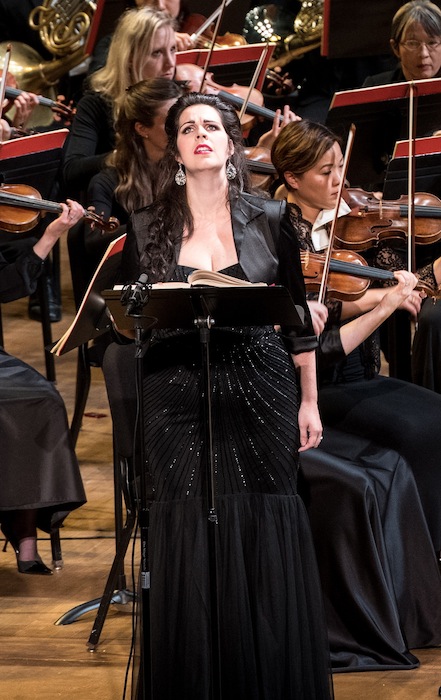Washington Concert Opera revives a rewarding Bellini rarity with “La straniera”

Amanda Woodbury made her Washington Concert Opera debut in Bellini’s “La straniera” Sunday night at Lisner Auditorium. Photo: Don Lassell
Washington Concert Opera is having another delightful bel canto season this year. Artistic director Antony Walker ticked off the next item on his bucket list of little-known 19th Century Italian operas with a performance of Bellini’s La straniera, heard Sunday evening at Lisner Auditorium. Even among devoted opera fans, such as those who make up a typical audience at WCO events, Bellini’s fourth opera, premiered in Milan in 1829, is an obscurity.
It should not be. True, even by bel canto standards Felice Romani’s libretto is impossibly convoluted, prompting much incredulous laughter in the audience. A count in medieval Brittany falls in love with a mysterious woman, the “foreigner” of the title, who has taken up residence in a hut by the edge of the local lake. He jealously mistakes another man who visits her for her lover, although he is secretly her brother in disguise. After the two men fight a duel, it is revealed that the “foreigner” is none other than the Queen of France in disguise.
The music, though, is intensely beautiful. Amanda Woodbury, a rising young soprano, made a powerful case for the title role, from the moment of the character’s gorgeous off-stage first appearance. Her silken legato and laser-precise intonation made this slow, lamenting aria ravishing, and she deployed exquisite soft high notes and some agile runs later, especially in the showpieces that bring the opera to its tragic conclusion. It was a stellar company debut by any standards, with some slight strain at the very top of her range the only sign of the ongoing recovery from illness announced before the performance.
As Arturo, the jealous count, tenor Gerard Schneider had a less brilliant debut. His is a voice that brims with potential, and at times the head voice-infused high notes, effusive squillo and sobbing tone seemed ideally suited to the bel canto repertoire. The result was much less finished and refined, however, with many lapses of intonation, where the melodic line, perhaps learned too quickly, became obscured as it trended flat. He tended to hurl his high notes in a fearless way, with occasionally ugly results; the worst being near the end of the trio “No: non ti son rivale,” where a top note, perhaps interpolated, went awry in a jarring way.
Baritone Javier Arrey, a regular with Washington Concert Opera, was in optimal voice as Valdeburgo, the disguised brother. His melting legato singing was poised, avoiding any harshness in the tone. The other striking company debut was by mezzo-soprano Corrie Stallings, whose appearances as Isoletta, the wronged fiancée of Arturo, were one of the highlights of the evening, a voice capable of chesty strength and silvery lightness at the top. She was perfectly matched to Woodbury in the wedding quartet, where the two sing in parallel.
Tenor Jonas Hacker, familiar from recent seasons at Wolf Trap Opera, was a repellent villain as Osburgo, with a range of vocal tone colors in the characterization. Less distinguished but capable were supporting turns by Matthew Scollin as the local ruler, Montolino, and Timothy Bruno as Il Priore, the judge of the Act II trial, both with plenty of volume but obscured too often by overactive vibrato.
Walker drew much to appreciate from the score, which yields many discoveries, not least the music introducing La straniera’s opening romanza. A few bars in the woodwinds bear an uncanny familiarity to the love theme of Wagner’s Tristan und Isolde, betraying the influence of the Italian composer on him. The oboe solo that follows it is equally striking, played with plaintive beauty by Fatma Daglar, and the four horn players were both elegant and boisterous in the extended writing for the hunting scene with the chorus.
The choral scenes, especially the opening tableau, are another highlight, sung with restrained beauty by the WCO chorus, prepared by assistant conductor David Hanlon. Walker continues to amaze at the level of polished performance he is able to produce despite limited rehearsal time with all forces together. Some missed entrances and ensemble misalignments occurred, as they will, but Walker’s assured knowledge of the score and easy confidence always saved the day.
Washington Concert Opera returns next year with Donizetti’s Maria di Rohan, 6 p.m. February 18, 2018. concertopera.org
